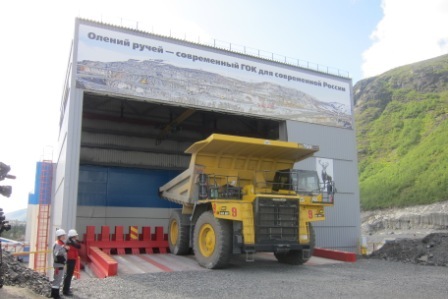On July 24, Acron subsidiary North-Western Phosphorous Company (NWPC) began its commissioning of the Oleniy Ruchey mine.
Acting Governor of Murmansk Region Alexei Tyukavin, Governor of Novgorod Region Sergey Mitin, Federation Council members, State Duma deputies, representatives of ministries and government agencies, Acron Coordinating Board Chairman Viatcheslav Kantor, Acron and NWPC top managers, and representatives of local authorities, corporate partners, and design and research institutes took part in the ceremony.
In 2006, NWPC obtained the licence to develop the Oleniy Ruchey deposit; in 2008, it received approval fr om the State Expert Evaluation Department of Russia and a appoval for the mine construction. The full-scale construction began in 2010 alongside work on the open pit, processing facility and infrastructure. To date, the first stage of the processing facility is completed; the equipment has been installed and tested, and all the parts and units have been load-tested. The tailing dam facilities are ready for operation and already hold the volume of water needed for the operation launch. Construction of the underground mine has started.
During the course of construction at Oleniy Ruchey, 89 facilities were built, approximately 100,000 m3 of concrete were poured, 13,000 tonnes of metal structures and 70,000 m2 of wall and roofing panels assembled, 41,000 m of pipelines laid and over 40 km of roads built. Over 3,000 people were involved in the mine’s construction.
During the first stage, the mine capacity will be 1 million tpa of apatite concentrate. Once the second stage is commissioned in 2017, capacity will increase to 2 million tpa of apatite concentrate. Acron Group has already invested US$430 million in Oleniy Ruchey and expects to invest a total of US $1 billion by the project completion.
During the ceremony, Viatcheslav Kantor said:
“We are constructing the Oleniy Ruchey mine at our own expense, but we have full governmental support. There are three key factors that promise to make this project a success. First, twelve years of political stability in Russia have made it possible for the economy to grow vigorously, allowing us to develop from concept to completion a project that has no peer in modern Russian industry. The second important factor was the fact that the government did not require us to pay a high admission fee to the phosphate market: we obtained the deposit development licence through a tender, wh ere our programme for comprehensive processing of apatite-nepheline ore was taken into account. And the third important factor is the field characteristics – open-pit mining of apatite ore with subsequent transition to underground mining is possible at Oleniy Ruchey; this will allow us to produce apatite concentrate as promptly as possible.
Russia’s modernisation must be founded on reindustrialisation. New ventures are bringing about a transition of Russian industry from extensive development to intensive models. Acron demonstrates this approach in everything it does. As a fertiliser producer, we have built the first mine to provide our production facilities with raw materials. We developed and patented our own proprietary technology for comprehensive processing of apatite concentrate and extraction of rare-earth elements. This kind of approach underlies the steady and progressive advance of the Russian economy.”

